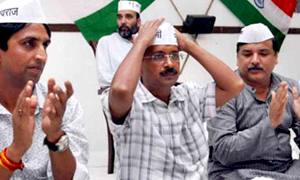
While not many are willing to go on record with their take on 'India's newest political phenomenon' — Arvind Kejriwal-led Aam Aadmi Party — and its potential impact on the upcoming general elections, almost every foreign leader is quizzing their Indian counterparts about these issues.
Some Indian leaders have dismissed AAP's emergence calling it a Delhi-centric development and saying such authoritarian and mob-based politics has no place in the Indian democracy.
Still, they admit that AAP has caught the imagination of people in India and it cannot be wished away as it is making the right noises about the need to improve governance.
While trying to convince foreign investors about the continuity of the Indian growth story, the Indian leaders are also facing tough questions here about the widespread anticipation that the next elections could throw a fractured mandate, said many participants at the WEF.
According to them, AAP's emergence on the political scene has further added to the uncertainty about the outcome of Lok Sabha poll and corporates have begun looking into the possibility of engaging with this new political force.
An Indian-origin chief of a large global conglomerate said he was so impressed with speeches made by Kejriwal that he called him up from overseas and expressed his desire to meet him on his next visit to Delhi.
While seriously wanting to engage with this new phenomenon, the businessman said he could not pursue the same as it would have attracted unnecessary publicity about being aligned with one particular political force that is currently in the eye of storm of every other party.
Industry body CII's director general Chandrajit Banerjee said the political scenario is always very important for the economic policies of a country and therefore general elections are definitely a crucial issue.
"As far as AAP is concerned, it is too early to make a judgement, although emergence of this party has definitely been a curtain raiser sort of thing for everybody," he said, while adding that the CII is also looking at engaging with AAP like it has done with all other political parties.
He admitted that the emergence of AAP has brought to the fore one clear theme — about governance and accountability of the government.
"This could be a big game changer and anybody who comes to power would have to focus a lot on governance and ensure that there is accountability on their part," Banerjee said.
IT major Tech Mahindra's vice-chairman Vineet Nayyar said political elections are always an issue and they create their own anticipations.
"The world cannot be indifferent when one-seventh of the world is going to get a new government. Obviously there is an interest (among foreign leaders here) in Indian elections, because India is very important on the global economic platform," he said.
Global rights group Amnesty International's secretary general Salil Shetty said the emergence of AAP has shown that people "do not accept nonsense anymore" and similar trends are being seen in Brazil, Russia and many other places.
"Accountability to the population has to be there. AAP emergence has at least created a scare among the political leadership that you have to be accountable," he said.
Bharti Group chairman Sunil Mittal said that AAP is an expression of people's thinking.
"I am a keen political observer. For me, AAP is nothing but an expression of people's thinking....
"It will be one of the most difficult elections to predict, but it will be one of the most interesting elections," he said while participating in a session on India here on Wednesday.
During the session, finance minister P Chidambaram had said that AAP should quit if they don't know how to govern.
"That (holding two-day long dharna on Delhi streets) is not governance. That is abdicating governance. If you don't know how to govern, quit," he had said.
On why the Congress party was continuing to support the minority AAP government in Delhi, Chidambaram had said, "Opinion in the party was divided. Local unit took that decision, right or wrong. The point is whoever is in government, must govern".
"You can't mask your inability to govern by street agitations. The line that divides agitation and anarchy is a very thin line and they may have crossed that line in the last few days," he said.








Comments
Add new comment